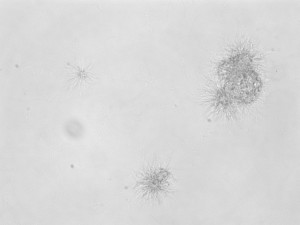Wilke Cohen Lyme Disease Project Receives $3M from the Steven & Alexandra Cohen Foundation
 subramanian.isbscience.org/2016/06/01/wilke-cohen-lyme-disease-project-receives-3m-steven-alexandra-cohen-foundation/
subramanian.isbscience.org/2016/06/01/wilke-cohen-lyme-disease-project-receives-3m-steven-alexandra-cohen-foundation/PRESS RELEASE
- Total Funding Has Reached $6.1 Million
- ISB Researchers Have Discovered Potential Biomarkers and Successfully Reproduced the Borrelia Bacteria in the Lab
SEATTLE – June 1, 2016 – Institute for Systems Biology (ISB) has received a transformational, multi-year pledge from the Steven & Alexandra Cohen Foundation to support the Wilke Cohen Lyme Disease Project. In addition to an initial $3.1 million in funding from Jeff and Liesl Wilke, Jeff and MacKenzie Bezos, and the Bay Area Lyme Foundation, the project now has commitments totaling $6.1 million in pledges and cash.
“We are excited to help Dr. Lee Hood and the Wilke Cohen Lyme Disease Project in the important work they are doing to help those who suffer from Lyme disease,” said Alex Cohen, co-founder and president of the Steven & Alexandra Cohen Foundation, which has committed more than $50 million to more than 20 Lyme disease projects. “Lyme is a very complex and also poorly understood disease. However, we believe in ISB’s holistic, systems approach and share their commitment to finding more effective diagnostics and treatments.
“We are grateful that Steven and Alex Cohen understand the power of ISB’s systems approach to tackle the complexity surrounding Lyme disease,” said Dr. Lee Hood, ISB president and principal investigator. “While we have made some promising initial discoveries, we have a long way to go and this funding is crucial to our goals.”
Research Highlights:
- Potential biomarkers: ISB researchers have discovered potential biomarkers, including a set of proteins in the blood known to be important for bone marrow regeneration and stability and other sets of proteins that are key players in the immune response. The results are preliminary and requires extensive follow-up.
- Systems analysis of Lyme disease: ISB researchers and their collaborators have completed the first year of a prospective study in which subjects with newly diagnosed Lyme disease were enrolled and provided blood and urine specimens at several different time points. ISB’s analysis will cover blood and urine proteins, blood and urine metabolites, patients’ immune response, and genetic factors contributing to Borrelia strain differences.
- Multi-omic analysis: The new patient samples enable deep multi-omic analyses that will best reveal useful biomarkers, vaccine targets and possibly new therapeutic targets. The blood and plasma samples will help verify the previously identified protein biomarker candidates and enable detailed exploration of the patients’ immune response to Borrelia infection.
- Detection: ISB researchers have begun an in-depth mass spectrometry-based analysis of Borrelia coat proteins with the ultimate goals of developing methods for direct detection of the Borrelia pathogen and identifying potent vaccine targets.
- Proteomics: ISB’s Moritz Lab has successfully developed a way to grow large quantities of the Borrelia bacteria in the lab, which is necessary to enable the study and identification of the proteins that are crucial to developing diagnostic tools for Lyme.

Image: Borrelia burgdorferi bacteria clustered in a lab dish. Because the growth media for Borrelia is not readily available, Dr. Rob Moritz’s lab at ISB had to formulate the components “from scratch.”
“We are thrilled with both the gift and added enthusiasm from Alex and Steven Cohen for an already groundbreaking project,” said Liesl Wilke. “The project now shares our names, our support, and our very high expectations for the team at ISB. There’s no stopping the Wilke Cohen Lyme Disease Project; full speed and great science ahead.”
Lyme disease is caused by the bacteria Borrelia burgdorferi, which is transmitted to humans through the bite of a black-legged tick. The most common symptoms of Lyme disease – named for Lyme, Connecticut, where the earliest cases were discovered and eventually connected to tick bites – can include muscle and joint pain, flu-like symptoms, heart palpitations, and often a red, circular rash, which may resemble a “bull’s-eye.” Lyme is difficult to diagnose because many people don’t know that they’ve been bitten. While most infections can be treated with antibiotics, there are patients who develop arthritis and other lingering symptoms including profound fatigue, neurological issues, and joint and muscle pain. About 300,000 new cases of Lyme disease are reported yearly to the CDC.
The Wilke Cohen Lyme Disease Project is an imperative step toward understanding the longitudinal dynamics of the acute disease, which is essential to tackling chronic Lyme. This research will help untold thousands who have suffered this confounding disease.
Media contact: Joe Myxter, Director of Communications, 206-732-2157, email
Philanthropy: Nick Newcombe, Director of Development, 206-732-1287, email
Related content: ISB Launches 3-year Wilke Lyme Disease Project (3/26/15)
ABOUT INSTITUTE FOR SYSTEMS BIOLOGY: The Institute for Systems Biology is a nonprofit biomedical research organization based in Seattle, Washington. It was founded in 2000 by systems biologist Leroy Hood, immunologist Alan Aderem, and protein chemist Ruedi Aebersold. ISB was established on the belief that the conventional models for exploring and funding breakthrough science have not caught up with the real potential of what is possible today. ISB serves as the ultimate environment where scientific collaboration stretches across disciplines and across academic and industrial organizations, where our researchers have the intellectual freedom to challenge the status quo, and where grand visions for breakthroughs in human health inspire a collective drive to achieve the seemingly impossible. Our core values ensure that we always keep our focus on the big ideas that eventually will have the largest impact on human health. ISB is an affiliate of Providence Health & Services.




